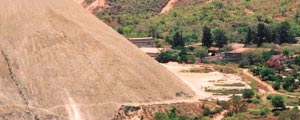
Workers at Mashava mines comprising Gaths Mine, Temeraire and King Mine have been experiencing hell since the government took over the operations at Shabanie Mashaba Mines (SMM) in 2004.
Report by Kamurai Mudzingwa
SMM was owned by business tycoon Mutumwa Mawere until the government took over and appointed an administrator under the Reconstruction Act, but failed to keep operations alive at the mines.
The operations finally ceased in 2008 paving the way for the suffering of more than 3 000 workers and their families.
“When the government took over and operations ceased in 2008, we were thrown into poverty’s deep end,” said an artisan at the mine, who refused to be named for fear of victimisation.
“Nobody cared about us anymore. There were no salaries from then, nothing. We were just staying here and surviving by the grace of God,” he said.
Workers said only critical staff and senior management were receiving $40 per month since 2008 until recently, when they started receiving around $150 after about 40 days.
“We are just informed to go to the bank when the money is in. There are no pay slips; it is the bank teller who tells you how much you can withdraw from the bank. The money is not adequate and it comes well after a month would have lapsed,” a worker said.
- Chamisa under fire over US$120K donation
- Mavhunga puts DeMbare into Chibuku quarterfinals
- Pension funds bet on Cabora Bassa oilfields
- Councils defy govt fire tender directive
Keep Reading
“The problem is that management does not allow us to work elsewhere because they say we are employees of the mine. If they get to know that you are working elsewhere, the $150 benefit is stopped and they say you are fired. We are forced to sit and wait for the $150,” he said.
But since 2008, life for the workers has been hell. Social and economic problems dogged families.
“We would travel on foot as far as Bhuka rural area which is about 40km to do menial jobs. Sometimes we would spend the whole day working in villagers’ fields for a bucket of maize,” he said.
Because of their desperation, the workers were exploited for cheap labour by companies located around Mashava.
“There are small companies mining mostly gold and chrome around this place including some Chinese company. They engage us on a part-time basis.
Sometimes we are forced to work from 7am to 6pm for $5 a day,” said a former workers’ committee member.
“It is ironical that the Chinese, although they made us work for many hours for paltry amounts, seemed to understand our plight and are more sympathetic. They would make us rotate so as to give everyone a chance for survival. They would engage each one of us for not more than four days.”
The situation also gave birth to serious social problems.
“Many marriages fell apart since 2008,” said a worker at one of the mines.
“Married women were openly selling sex to workers from the small companies mining around Mashava. Some women were being taken for a packet of maize-meal.
“A number of married men and women ditched their spouses and escaped to the Diaspora, mostly to South Africa and Botswana,” he said.
“We have a lost generation due to the financial crisis,” said a woman at King Mine.
“Most children could not go to secondary school as parents failed to pay school fees. We have a number of children who turned into street kids both in and around Mashava and in neighbouring towns such as Masvingo and Zvishavane because they failed to go to school and they were attempting to escape from the hunger that was gnawing at the roots of our existence,” she said.
The sanitary and water conditions at the mines are so bad that it is a matter of time before disaster strikes.
The infrastructure is deteriorating and there are clear signs of disrepair.
“We just loiter around with nothing to do. The mines at Mashava used to nurture talent in sport, arts, music etc. Remember Devera Ngwena Jazz Band that took the musical scene by storm in the 1980s and 1990s? Remember soccer stars such as Francis Shonhayi, Zvenyika Makonese and Choddy Chirwa? They were nurtured here.
“All this is no more. There is no entertainment, no recreation and talent is going to waste,” said a former boxer at the mine, with nostalgia.
The dilapidated state of the once majestic Gaths Mine Stadium — one of the first stadiums in this country to boast of a synthetic athletics track — tells the story about the decaying infrastructure. The track is now mere dust.
The desperate workers and their families interviewed, have no faith in the government’s capabilities of bringing back the hey day to Mashava.
“They are just politicians and not business people and they are heartless,” said a fitter and turner at the mine.
“They have failed. They should just give back Mutumwa Mawere his mines. “We have had several promises to the effect that deals with investors were very close and nothing has materialised.
“This has been going on for years. We know they won’t be able to resuscitate the mines. Our suffering will continue,” he said bitterly.
SMM mines were once some of Africa’s largest asbestos producers and they enjoyed market share in the US, UK, Angola, Nigeria, Zambia, Mozambique, India, Iran, the United Arab Emirates, China and Indonesia.
The mines are said to be sitting on reserves that can be exploited for more than 20 years.
Management could not be reached for comment as they were said to be away on weekend.











